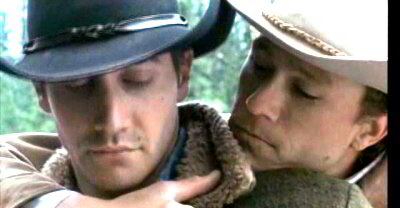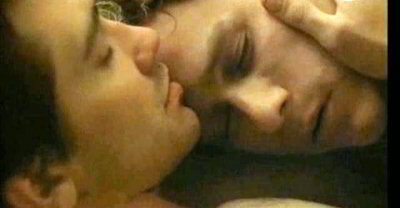'Brokeback' Backlash: What Gives???
 Well, folks, I suppose it was inevitable. Eventually, somebody with a self-righteous sense of self-importance just had to rain on my parade. What am I talking about, you ask? Well, the rather swift backlash directed toward the wondrous film Brokeback Mountain.
Well, folks, I suppose it was inevitable. Eventually, somebody with a self-righteous sense of self-importance just had to rain on my parade. What am I talking about, you ask? Well, the rather swift backlash directed toward the wondrous film Brokeback Mountain.If you've been reading along in my blog, you know that I found this movie to be quite revelatory. Of course, I knew that not everybody was going to fall in love with the movie as I have, but I surely didn't expect a large portion of the caterwauling to come from the gay community itself. But yet, here is David Ehrenstein, erstwhile "critic" whose biggest claim to fame is, well, being given a special thank you in the credits of Rob Epstein and Jeffery Friedman's The Celluloid Closet, ranting and raving in the Dec. 8 entry of his blog about how Brokeback Mountain is nothing more than a "chick flick" that panders to heterosexual notions of the gay lifestyle and encouraging people to skip it completely.
Now, I normally pride myself on being a mature adult who is perfectly capable of accepting the fact that not everybody thinks the same way that I do, and it's perfectly acceptable for somebody not to share all of my opinions. But I do have to take issue with Ehreinstein's rather arrogant dismissal of such an important film. Furthermore, it bothers me that someone of Ehrenstein's stature would actually encourage people not to see the movie. We all know that the reason Hollywood chooses not to make "gay films" is because they are, quite frankly, not marketable to the mainstream. So you would think that, even if one were to not like the movie, he or she would at least encourage people to go see it if for nothing else than to help the film be a success so as to pave the way for other, (perhaps) better movies to come along.
 I've gotten into a few arguments with people about the movie as well. And so far, the criticism seems to be focused on the film's so-called "tragic" depiction of gay relationships. I don't want to spoil the movie for anyone, so I won't give any specifics, but well, it doesn't end happily. Already, some are lambasting the film for not fulfilling their rather delusional fantasies of "happily ever after." What most of these (so-called) critics fail to address, however, is that the film is set in 1963, in the unforgiving countryside of Montana, where masculinity is defined by how many steer you rope, how many beers you drink and how many cherries you pop. The film captures a time and place in which, for two men in love with each other, living an openly gay lifestyle was simply not an option. Yet, instead of encouraging gays to stay in closet (as most of the film's detractors seem to be implying), the film does the exact opposite in its depiction of the reality of the film's era. Indeed, the movie is nothing if not a call for all people--gay or straight--to break free of the restrictive nature of society's shackles and seize the day. Its true message (for anyone intelligent enough to see it) is that we should all live for ourselves, not in the eyes of others.
I've gotten into a few arguments with people about the movie as well. And so far, the criticism seems to be focused on the film's so-called "tragic" depiction of gay relationships. I don't want to spoil the movie for anyone, so I won't give any specifics, but well, it doesn't end happily. Already, some are lambasting the film for not fulfilling their rather delusional fantasies of "happily ever after." What most of these (so-called) critics fail to address, however, is that the film is set in 1963, in the unforgiving countryside of Montana, where masculinity is defined by how many steer you rope, how many beers you drink and how many cherries you pop. The film captures a time and place in which, for two men in love with each other, living an openly gay lifestyle was simply not an option. Yet, instead of encouraging gays to stay in closet (as most of the film's detractors seem to be implying), the film does the exact opposite in its depiction of the reality of the film's era. Indeed, the movie is nothing if not a call for all people--gay or straight--to break free of the restrictive nature of society's shackles and seize the day. Its true message (for anyone intelligent enough to see it) is that we should all live for ourselves, not in the eyes of others. Were the film set in contemporary times, then yes, I could see how some of these people might have a point, but really, isn't this a little bit like walking up to an effeminate gay guy and accusing him of perpetuating negative stereotypes? Can you really be a stereotype if you're simply being who you are? Likewise, Brokeback Mountain is nothing if not an honest depiction of the period the film encapsulates. Nothing it presents is outside of the realm of possibility.
So the movie doesn't have a big sappy happy ending in which the cowboys (actually, ranch hands) ride off into the sunset together holding hands. Big frickin' deal. I don't recall Romeo and Juliet celebrating wedding nuptials, or Bogart and Bergman running off together in Casablanca. For that matter, Leonardo DiCaprio and Kate Winslet didn't exactly have the happiest of endings in Titanic. Where is it written that, simply because a film features gay characters, it is required for the film to end happily? I don't go to the movies to be spoon-fed some trite Hollywood finale in which everyone gets what they want and all is just fine and dandy. In whose world does that happen? Brokeback reminds us that love is nothing if not fragile and rare. It reminds us that we are not alone.
 I'm also hearing gripes about how in the film's press, Jake Gyllenhaal and Heath Ledger keep talking about being straight actors portaying gay roles (by that token, let's demonize Renee Zelwegger--an American--for talking about her difficulties playing Londoner Bridget Jones, or Nicole Kidman's frustrations in perfecting an American accent), and how wrong it is that straight actors should play the roles in the first place when there are so many capable openly gay actors out there. As far as the latter criticism is concerned, I pose this question: Just who, besides gay people, would go see that movie? Isn't the whole point of Brokeback Mountain--a film with the Hollywood pedigree and talent to potentially lure residents of Smallville, USA to a "gay film"--to get Middle America into the seats in the first place? (And, for that matter, hey, let's not let gay actors portray straight characters anymore. Guess that means that Ian McKellan and Rupert Everett will soon be out of work.)
I'm also hearing gripes about how in the film's press, Jake Gyllenhaal and Heath Ledger keep talking about being straight actors portaying gay roles (by that token, let's demonize Renee Zelwegger--an American--for talking about her difficulties playing Londoner Bridget Jones, or Nicole Kidman's frustrations in perfecting an American accent), and how wrong it is that straight actors should play the roles in the first place when there are so many capable openly gay actors out there. As far as the latter criticism is concerned, I pose this question: Just who, besides gay people, would go see that movie? Isn't the whole point of Brokeback Mountain--a film with the Hollywood pedigree and talent to potentially lure residents of Smallville, USA to a "gay film"--to get Middle America into the seats in the first place? (And, for that matter, hey, let's not let gay actors portray straight characters anymore. Guess that means that Ian McKellan and Rupert Everett will soon be out of work.)In my opinion, Ehrenstein and many of the film's gay detractors seem to be suffering from a self-imposed victim complex in which to present any image of a gay person in which that person is not a well-adjusted, openly gay individual becomes an affront to the entire gay community. Is it not OK for anyone to tell stories of gay characters that (gasp!) don't live idyllic lives of bliss and perfection? Have we forced ourselves so deep into the gay ghetto of victimization that we can't see past our own paranoia? If Ang Lee (or, for that matter, Annie Proulx, who wrote the brilliant short story upon which the movie is based) represents an affront to gay people, well, then, hell, Steven Spielburg must be one helluva racist for making The Color Purple. And, hey, while I'm at it: I'm Jesus Christ.
Guess it's time for the second coming after all. I sure do hope there are some gay cowboys there.
XOXO,
Hollywood Ken

3 Comments:
Ken: You hit the nail on the head here. And, unlike Mr. Ehrenstein on Americablog, did without nastiness, attitude, or name calling.
Oh wait, you must be a closet case then.....:)
Amen - I agree completely. And my one other observation and criticism of Mr. Ehrenstein - why is he chasing around after people who comment or critique his critique. Can you imagine Roger Ebert bashing a film, and then others in the blogsphere disagreeing with him - and then Roger Ebert constantly feeling the need to rebuff those who disagree. Mr. Ehrenstein had an opportunity many of us are not afforded - to post a review in The Huffington Post. A widely read blogsite (and not his own personal blogsite). As such, I would expect him to let his critque stand or fail on its own. But he seems to have this need to "get in the last word". Alas, this whole incident has told me more about Mr. Ehrenstein (whom I never heard of before this) than the movie itself.
Say it again, brother!!
Brokeback Mountain is a singular achievement that needs no justification against the likes of Ehrenstein.
I was a fan of the story and so I'm thrilled with the adaptation. The lyrical sorrow of the story has been served well by the filmmakers and damn, Heath Ledger is great!
I don't understand David's grouchy reluctance with this film except perhaps he wished it had been a musical version of The Kansas City Trucking Co a la Baz Luhrmann's Moulin Rouge.
Come to think of it, that's not a bad idea. But it just wasn't the concept of Brokeback.
Post a Comment
<< Home